PCSK9 Inhibitors Remarkable Drugs, Many Unknowns
PCSK9-I Patient Population and Potential [1] FDA-approved for relatively small patient group w/ uncontrolled LDL despite max therapy and at high risk for CVD. Familial hypercholesterolemia: ~620,000 in US.
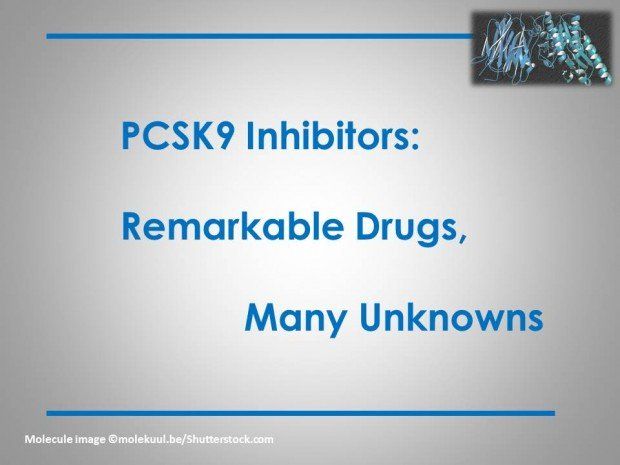
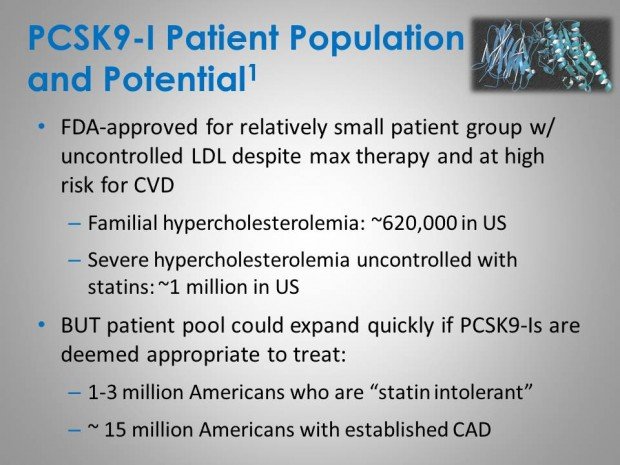
PCSK9-I Patient Population and Potential [1] FDA-approved for relatively small patient group w/ uncontrolled LDL despite max therapy and at high risk for CVD. Familial hypercholesterolemia: ~620,000 in US. Severe hypercholesterolemia uncontrolled with statins: ~1 million in US. BUT patient pool could expand quickly if PCSK9-Is are deemed appropriate to treat: 1-3 million Americans who are “statin intolerant," ~ 15 million Americans with established coronary artery disease.
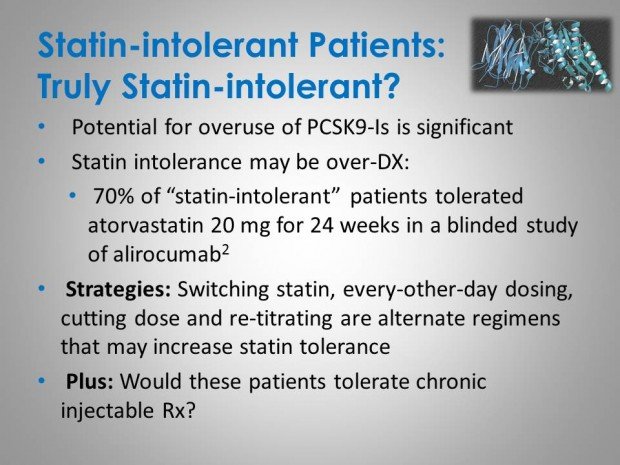

Statin-intolerant Patients: Truly Statin-intolerant? Potential for overuse of PCSK9-Is is significant. Statin intolerance may be over-DX: 70% of “statin-intolerant” patients tolerated atorvastatin 20 mg for 24 weeks in a blinded study of alirocumab [2]. Strategies: Switching statin, every-other-day dosing, cutting dose and re-titrating are alternate regimens that may increase statin tolerance. Plus: Would these patients tolerate chronic injectable Rx?
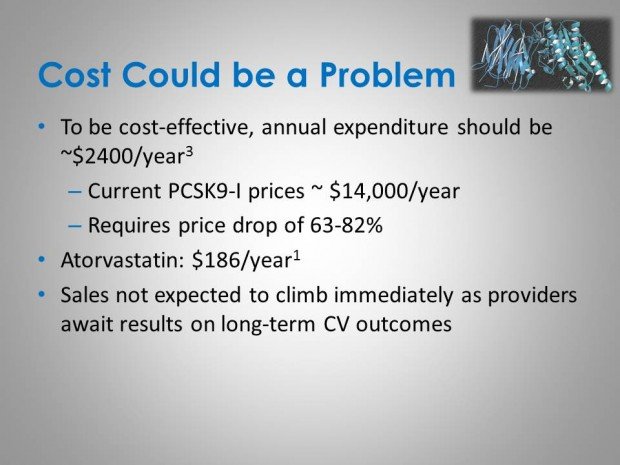
Cost Could be a Problem. To be cost-effective, annual expenditure should be ~$2400/year [3]. Current PCSK9-I prices ~ $14,000/year. Requires price drop of 63-82%. Atorvastatin: $186/year [1]. Sales not expected to climb immediately as providers await results on long-term CV outcomes.
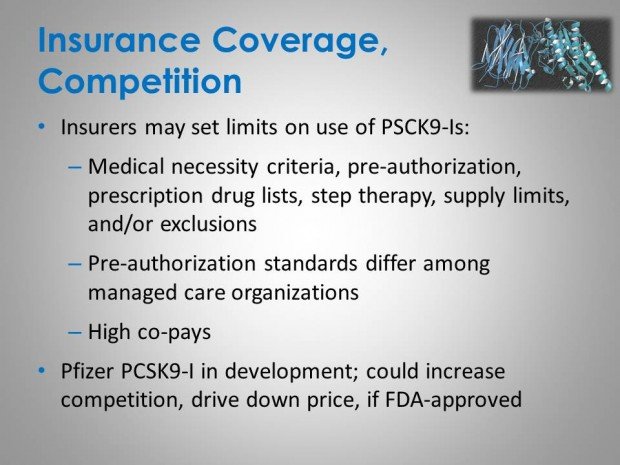
Insurance Coverage, Competition. Insurers may set limits on use of PSCK9-Is: Medical necessity criteria, pre-authorization, prescription drug lists, step therapy, supply limits, and/or exclusions. Pre-authorization standards differ among managed care organizations. High co-pays. Pfizer PCSK9-I in development; could increase competition, drive down price, if FDA-approved.
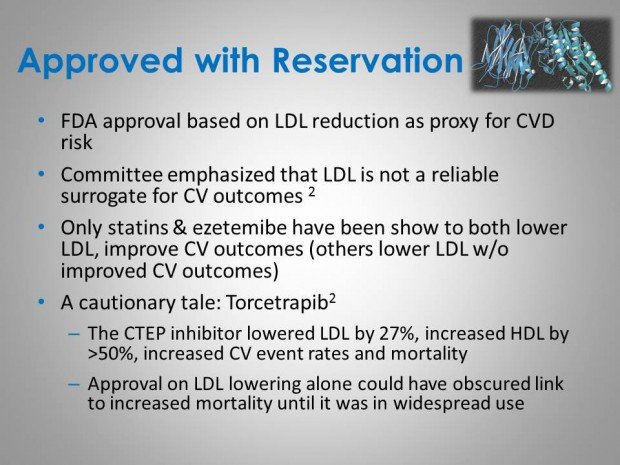
Approved with Reservation. FDA approval based on LDL reduction as proxy for CVD risk. Committee emphasized that LDL is not a reliable surrogate for CV outcomes [2]. Only statins & ezetemibe have been show to both lower LDL, improve CV outcomes (others lower LDL w/o improved CV outcomes). A cautionary tale: Torcetrapib [2] The CTEP inhibitor lowered LDL by 27%, increased HDL by >50%, increased CV event rates and mortality. Approval on LDL lowering alone could have obscured link to increased mortality until it was in widespread use.
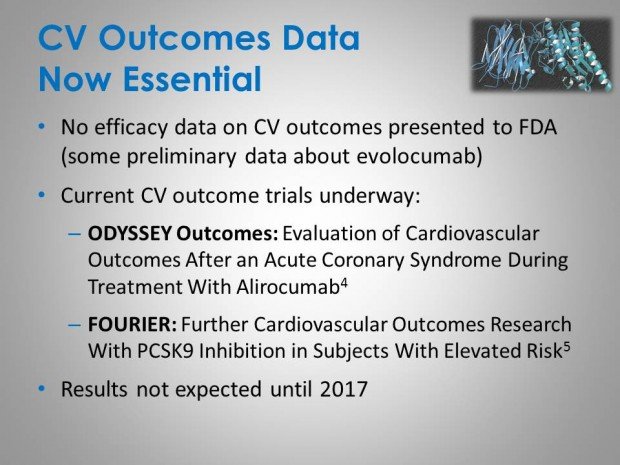
CV Outcomes Now Essential. No efficacy data on CV outcomes presented to FDA (some preliminary data about evolocumab). Current CV outcome trials underway: ODYSSEY Outcomes: Evaluation of Cardiovascular Outcomes After an Acute Coronary Syndrome During Treatment With Alirocumab [4]. FOURIER: Further Cardiovascular Outcomes Research With PCSK9 Inhibition in Subjects With Elevated Risk [5] Results not expected until 2017.
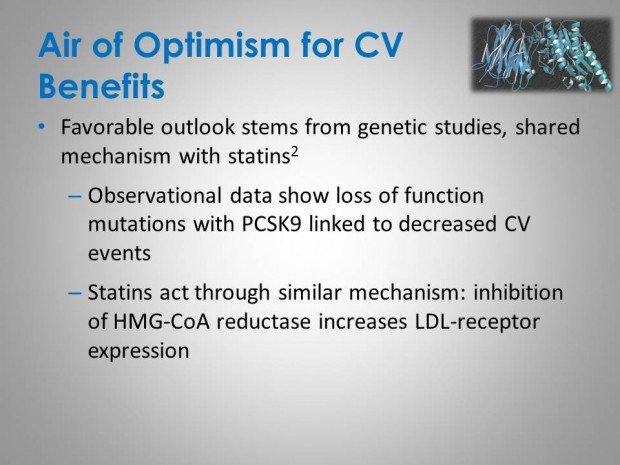
Air of Optimism for CV Benefits: Favorable outlook stems from genetic studies, shared mechanism with statins [2] Observational data show loss of function mutations with PCSK9 linked to decreased CV events Statins act through similar mechanism: inhibition of HMG-CoA reductase increases LDL-receptor expression.
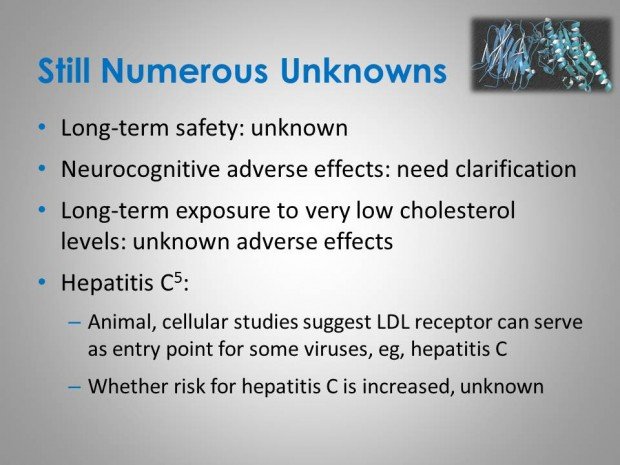
Still Numerous Unknowns. Long-term safety: unknown. Neurocognitive adverse effects: need clarification. Long-term exposure to very low cholesterol levels: unknown adverse effects. Hepatitis C [5]: Animal, cellular studies suggest LDL receptor can serve as entry point for some viruses, eg, hepatitis C Whether risk for hepatitis C is increased, unknown
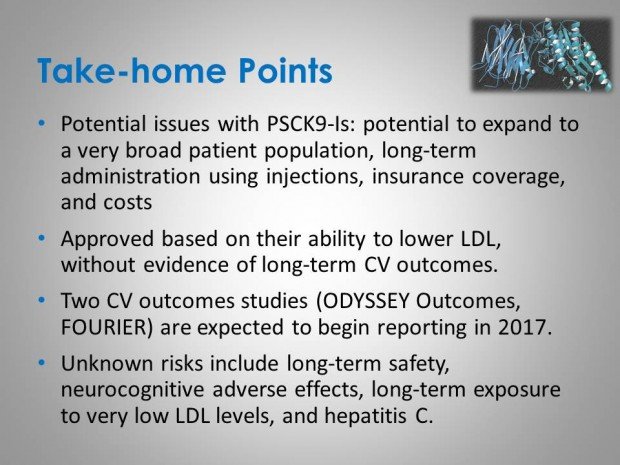
Take-home Points. Potential issues with PSCK9-Is: potential to expand to a very broad patient population, long-term administration using injections, insurance coverage, and costs. Approved based on their ability to lower LDL, without evidence of long-term CV outcomes. Two CV outcomes studies (ODYSSEY Outcomes, FOURIER) are expected to begin reporting in 2017. Unknown risks include long-term safety, neurocognitive adverse effects, long-term exposure to very low LDL levels, and hepatitis C.
The remarkable LDL-C-lowering impact of the PCSK9 inhibitors (PCSK9-I) evolocumab and alirocumab and their auspicious safety profile might suggest a blockbuster future for the recently approved monoclonal antibodies. The FDA imprimatur was given, however, amid strong resistance on the grounds that their true test of efficacy, yet to come, will be whether they have a direct and positive impact on cardiovascular outcomes.
Other unknowns about the PCSK9-I are reviewed in the slide show above and include:
⺠Will the indication be expanded to include the statin-intolerant population?
⺠What about early reports of neurocognitive impact?
⺠Can they be made affordable? Will insurance companies negotiate?
Are your colleagues discussing the new drugs? What is your prediction about their future?
REFERENCES:
1. Four things to know about PSCK9 inhibitors. Accessed October 21 2015 at: https://www.optum.com/thought-leadership/4-things-about-PCSK9-inhibitors.html
2. Everett BM, Smith RJ, Hiatt WR. Reducing LDL with PCSK9 inhibitors-The clinical benefit of lipid drugs. N Engl J Med. 2015;373:1588-1591. DOI: 10.1056/NEJMp1508120 (Free full text)
3. Institute for Clinical and Economic Review. Comparative Effectiveness Public Advisory Council. PSCK9 inhibitors for the control of high cholesterol: effectiveness, value, and value-based bench marks. Technology assessment. September 8, 2015.
4. Schwartz GG, Bessac L, Berdan LG, et al. Effect of alirocumab, a monoclonal antibody to PCSK9, on long-term cardiovascular outcomes following acute coronary syndromes: Rationale and design of the ODYSSEY Outcomes trial. Am Heart J. 2014;168:682–689.e1 (Abstract)
5. Further Cardiovascular Outcomes Research With PCSK9 Inhibition in Subjects With Elevated Risk ClinicalTrials.gov Identifier: NCT01764633.
6. Li C, Lin L, Zhang W, et al. Efficiency and safety of proprotein convertase subtilisin/kexin 9 monoclonal antibody on hypercholesterolemia: a meta-analysis of 20 randomized controlled trials. J Am Heart Assoc. 2015;4:e001937. doi: 10.1161/JAHA.115.001937. (Free full text)
